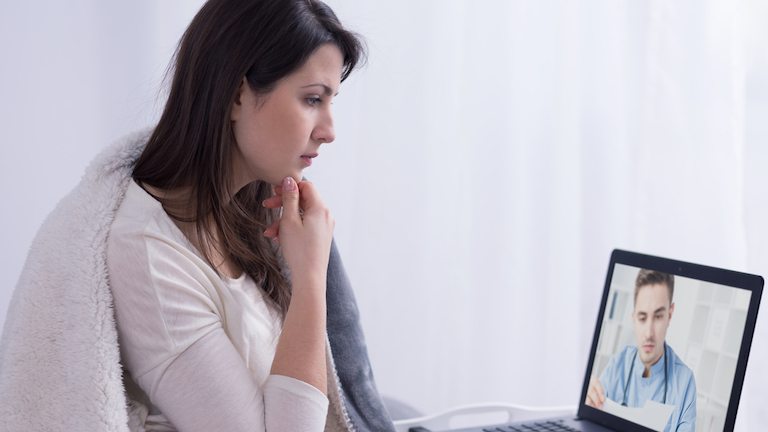Video therapy could soon replace a visit to the GP but could it help your depression? Dr. Julian Nesbitt – an A&E doctor who has seen all too closely the devastating effects of untreated mental illness, explains how this new phenomenon could help solve the UK’s mental health crisis
Last week the NHS announced its trialling of video link appointments to see your GP. The “GP at hand” service will allow patients that register to have faster access to GP consultations via a video link from your smartphone. This has obvious benefits of being able to have an appointment more conveniently but it the NHS has said it would not be suitable for dealing with mental health issues. With only 10 minutes for a consultation GPs struggle to help those suffering from these disorders. So could we use a similar technology to help those with mental health problems?
Scale of the problem
For years now, those suffering from mental health issues have been unable to find the proper support they need from the government. Around 1 in 4 people suffer from such difficulties, and the government, is not keeping up with the demand for mental health support.
In 2008, the government released new “Improving Access to Psychological Therapies” reforms, with the direct aim of hiring more licensed practitioners, and the necessary support to more people who need it.However, such measures haven’t been much of a success, as the waiting list to see a licensed professional can still be up to six months or more.

If you have suffered from some form of mental health issue, or are close to someone who has, then you’ll know just how long six months is to wait in order to speak to someone who can help.
As a doctor who has worked for a long time in A&E, I am all too familiar with the after-effects of those who have been unable to get the support they need in time. Such patients show tell tale signs of self-harm and, in more cases than I would like, attempted suicide. It’s truly heart breaking to meet individuals who have pleaded for more support from their local health service but have been let down. From speaking to them, it becomes painfully clear that, had the correct support been offered when they needed it most, so many cases of substance abuse, self-harm and attempted suicide, could have been avoided.
Much of the cost involved with treating mental health issues revolves around the need for face-to-face counselling, or through prescribing expensive drugs which, in far too many cases, can lead to added dependency problems.

5 ways video therapy can help
Online video consultation is something that has sprung up in recent years and has been widely adopted by private clinics. It allows those in need to speak to a counselling professional via an online device through a video link, without the need to meet in person. Unlike the GP consultation there is no need for physical examination in a mental health appointment, which makes video link counselling appointments more appropriate than the GP alternative.
Getting to the root cause of mental health issues is by no means a fast process, and instead, it requires the patient being able to form a special bond with their counsellor. Several in-depth studies have shown that disorders such as depression, anxiety, OCD, post-traumatic stress, eating disorders, substance abuse, and even schizophrenia can benefit from video therapy as they would from traditional face-to-face therapy methods. Others have found that video intervention could be effective in preventing suicide; via the use of a number of typical therapy techniques, including Cognitive Behavioural Therapy. Some evidence even suggests that video therapy may yield even higher levels of patient satisfaction than face to face.
1. It’s convenient
The need to visit a very clinical location is what often drives many with mental health issues to forgo seeking help, and instead, suffer in silence.
In fact, of the 5 most common mental health complaints in the UK, all 5 include symptoms which make seeking help problematic; such as irrational fears of outside environments or fatigue.
However, video therapy allows you to gain support from the comfort of your own home, whilst wearing your slippers and drinking a cup of tea from your favourite mug.
2. It’s time-friendly
Time is saved in numerous ways, in particular, you don’t have to travel to your appointment, there is no stress of trying to find a parking space and you don’t have to give up half a day at work in order to have an appointment. This can now take place at your convenience which can include evenings and weekends.
3. It’s accessible
Helping to make real change to someone suffering from mental health issues means committing to a number of sessions taking place regularly week after week; however, keeping such a consistent schedule is difficult with the heavy demands of everyday life. Taking sessions online means that they can be slotted in and around other daily tasks and allows for greater flexibility, including being able to have appointments from wherever you are in the world.
4. It’s cheaper
The cost of counselling is the driving factor behind a lack of support for mental healthcare in the UK, so it’s important to recognise that online video therapy could ease the financial strains on the NHS. With online therapy there is no need for the NHS to pay for expensive premises or the wide range of administration costs that always seem to be involved.

5. Fewer people on waiting lists
Freedom of choice regarding location and times mean that more sessions will be attended and where appointment cancellations occur they can be quickly released for rebooking online as opposed to via the current heavily manual processes.
In turn, this leads to less demand on the NHS for dealing with cases of self-harm and attempted suicide from those who have been unable to receive suitable care in a timely fashion.
So what’s the next step?
Once you take a moment to understand the merits of online video therapy, it becomes abundantly clear that this is something that needs to be rolled out quickly.
However, the NHS does not currently fund this next logical step in the healthcare service, and instead continues to get bogged down with outdated and more expensive methods of providing this vital care.
Luckily, an affordable alternative is now available for those willing to cover the small expense, and get access to professional care much faster, even the same day, than would typically be the case within the NHS.
Think you might benefit from videotherapy? Dr. Julian Nesbitt has created the Dr. Julian App, which puts patients in touch with trained mental health professionals who are ready and waiting to offer life-changing support through video therapy provided through the app. Therapy sessions start from £45. Learn more here.
Dr Julian Nesbitt is an A&E doctor with a passion for mental health
Read More
Depression, abuse, PTSD? 15 signs you need therapy
7 surprising signs you’re stressed
10 ways to relax after work without alcohol or food
17 healthy foods that fight depression
Lose 12kg in 12 weeks with the Healthista Lean Energy programme – Download your FREE copy now
Like this article? Sign up to our newsletter to get more articles like this delivered straight to your inbox.






















































